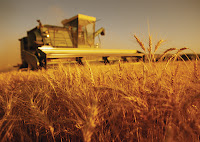 |
| Healthy Maize crop |
In the last 2-3 years, the country's grains production has come under severe threats thanks to factors both within our reach and others not entirely our fault. From
- environmental concerns - drought and poor rains;
- reduced yields in traditional bread baskets of Western and Rift Valley;
- poor storage methods which lead to bad grain - remember aflatoxin in Eastern parts of Kenya?
- poor farming practices - this is especially so with the small-scale farmers who use archaic methods of planting and tending to their shambas
- poor marketing practices which have led to grain farmers losing their grain to middlemen who are out to make a killing by hoarding this for speculative purposes. Read this article about rice and the EAC.
- invasion by disease and pests - this is the case with the weaver birds invading parts of Narok and also the current mosaic disease affecting some areas in the country
This has seen our strategic grain reserve under threat in the same number of years ( we can't forget the rumoured sale of grain reserves by some Ministry operatives in 2008-09 in the guise of seeking cheaper imports only to re-route the local grain back to the market at a higher price...).
Its begs the questions;
- Why can't the Ministry of Agriculture and other related Ministries such as Environment and Forestry come up with a master plan to improve farming practices both for large-scale and small-scale holders to ensure improved yields?
- Can the Ministries also improve our storage capacities across bread basket regions by building bigger and more silos to store these grains as and when they are harvested?
- In terms of irrigation, Kenya is still operating below the required minimum while the rate of population growth has been shooting up, what plans are there to ensure the Irrigation Schemes operate at above average and the harvest combined to ensure good yield across the country?
- Instead of always looking out for 'cheaper' imports, why can't the Ministry of Agriculture subsidise the farm inputs for the local farmers to ensure improved yields and thus better supply to the local market? The excess grain can either be exported or also used as animal feed where possible. The animal husbandry in the country has been growing and the processed feeds prices rising by the day...
- Remember the Bible story of Joseph dreams in Egypt of 7 prosperous years and 7 hard years? These good and bad cycles with regards to weather, climatic conditions have become shorter and every 2-3 years Kenya is bound to have drought and related conditions. Learn from them!
- A Commodities Exchange being set up? This has worked in other African countries such as Ethiopia and South Africa. Kenya can learn from the same.
- Initiatives such as those done by East Africa Breweries with regards to barley and sorghum farming should be encouraged. (Read more on what EABL is doing with sorghum here in beer production) You wonder if major millers in Kenya engage farmers and their co-operatives anymore or do they always want to hide under the guise of cheap imports to lower production costs?
- Can the efficiency of such bodies as National Cereals and Produce Board, Kenya Seed Company and related bodies be enhanced? Instead of appointing political rejects and rewarding your bosom buddies, Ms Waziri you can do the country a favour by standing up to competency and ensuring the security of our country's food reserves.
- Kenya lies right at the heart of the tropics. The said issue of reafforestation has NEVER BEEN taken SERIOUSLY and our forest cover percentage against recommended global benchmarks is really ALARMING! The handling of the Mau and other forest areas evictions have been badly handled yet we've all seen the effects it has on the environment. Can't we ensure that there is minimum forest cover in every county to ensure mitigating against environmental concerns?
- Over-emphasis on cash crops at the expense of food crops - though many may not agree with my opinion, we have been laying emphasis on cash crops such as tea and coffee for too long yet we're not sufficient in supplying food to our local populace. Can the Ministries rethink these models?
- What quotas are given to millers who get the right to import the grains?
 |
| Wheat harvesting |
Answers to these questions will ensure Kenya becomes self-sufficient in grains to feed not just her own population but also feed neighbouring countries. This will ensure enhanced food security and grain reserves not just for the country but for the region too. In a continent that is growing in leaps and bounds, food security is imperative if Kenya is to achieve its ambitious economic goals.
No comments:
Post a Comment